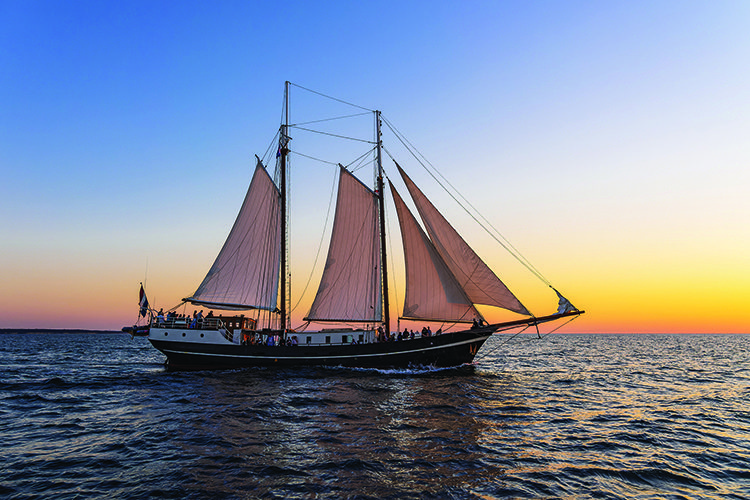Leadership
Are you a bus driver or a sea captain? If you are in leadership, you are both.

In Jim Collins’ epic business book, “Good to Great,” he highlights having the right people on the bus and having them in the right seat. I think there is a better metaphoric vehicle for us to imagine in today’s business environment. In the family-owned business I founded, we have 250 souls. These crew members count on me, as their leader, to navigate the direction of our business today and into the future.
I believe we should think of our organizational vehicle as a deep-water sailing ship. The CEO might hold the wheel, but the souls are not only passengers but also active members of our crew as we deal with the current that is changing every day. How we deal with weather that ebbs and flows and the periodic storms we encounter define us. We would prefer every day to be a perfect sunny day, and some are, but they are the exception, not the rule. When we do experience them, we simply enjoy them while they last.
Each member of the crew has to deal with what comes their way. The wind shifts, the sails must be retrimmed and our expectations must shift. When the water gets rough, how are we going to pivot appropriately? Every day, there is something with which we will struggle; our crew must be able to react to the changing environment. They must stay agile enough to do their part.
We set a course but we have to be prepared to adjust. Our expectations must be flexible enough to allow us to make course corrections to get us to the next port.
My company designs and builds robotic automation for multiple industries. We have a team of skilled people in positions to help us successfully navigate the deep waters of our industry. We have our first mates, the managers of each business unit. Ensuring the crew is all working together to follow the captain’s direction, we have engineers helping us navigate what we need to do and how to get there. This might be equipment design or software, but it has to adapt to the ever-changing needs of the market.
What was a good solution last month might have to be changed for the needs that are coming up next.
Besides our first mates and navigators, we have our sailors, the men and women who build our machines, and the technicians who have to assemble, wire, plumb, test, install and train our customers how to use these robotic solutions.
For the sailors to be effective, they need to eat. They need the parts to build these machines. Some parts are standard parts that can be purchased from suppliers specializing in an area; some parts must be custom-built for the system we build to work. I liken the purchasing, receiving and shipping to cooks on the ship. We can have all the right people, but if they are not fed what they need, we will not get very far.
At Edgewater Automation, once we design and manufacture the parts, assemble the machine, wire and plumb the machine, and debug the software, we are ready to install the machine in our customer’s plant. This effort might take someone from each role to help bring this custom piece of equipment to life.
The whole team has to work together, for when the storm comes, we all have to take an oar and row. A navigator cannot sit by and say, “I did my part, I mapped out the way, I have no control of a storm.” No, the navigator and everyone else must have an all-hands-on-deck commitment to keep the ship afloat and headed to a safe port.
What will we do when we get there? Restock, of course, and go to the next port. We are adventurers; we are not stagnated, regardless of how old a company we lead. If you are 100 years old, you have experienced plenty of rough water, so you know better how to navigate. However, if you are a start-up, you might find a new way to get to the next port even faster but think outside the proverbial box dictated by a history to which you, the new leader, are not bound.
Our ships are always in motion. Even in port, we are delivering or resupplying, but we are not vacationing. This is not a pleasure boat; it is a sailing cargo ship, delivering parts and equipment to help others keep their ships afloat or their crew fed. We are all in it together.
Rick Blake is the founder and CEO of St. Joseph, Michigan-based Edgewater Automation. His firm specializes in automation engineering for manufacturers using robotics, machine vision, motorized control and software control. He can be contacted at 269-983-1300.




